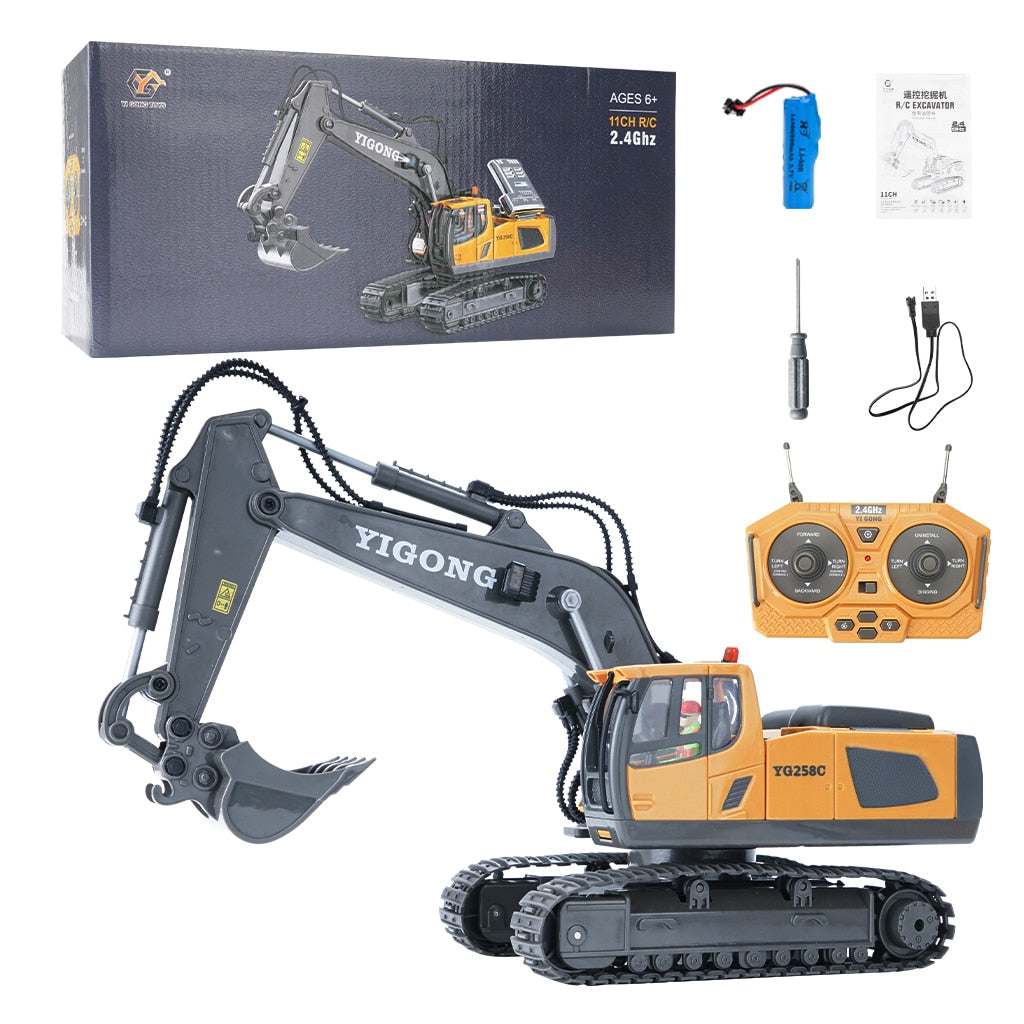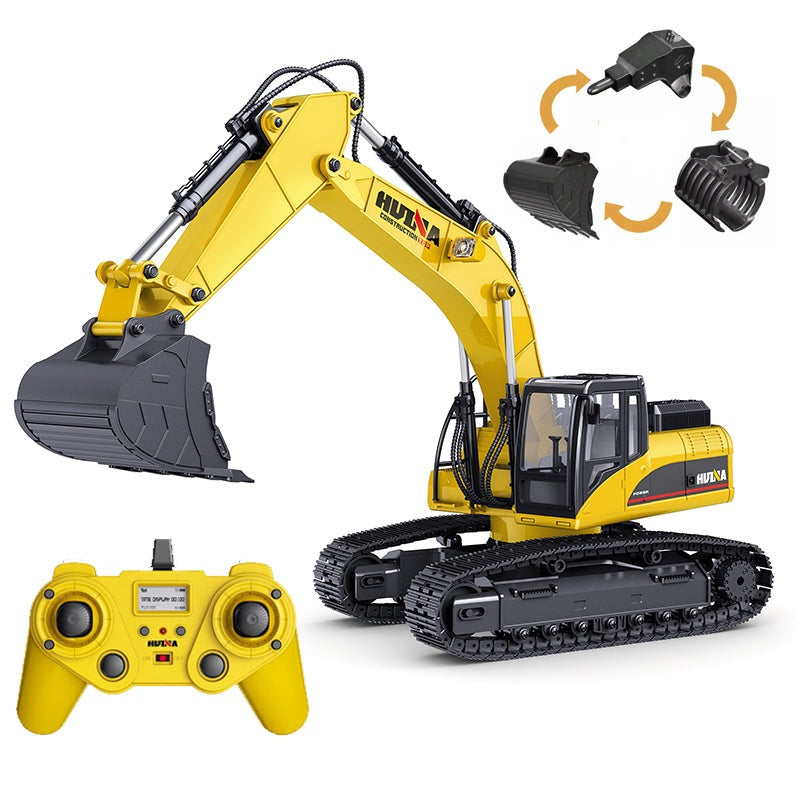Can a rc excavator Save You Time and Money? Here’s How
Wiki Article
Discover the Relevance of Excavator in Modern Construction Projects
Excavators are crucial tools in modern construction jobs. Their convenience allows them to carry out a broad array of jobs, from excavating and grading to demolition and site prep work. Advanced functions, such as hydraulic add-ons and GPS, boost their capabilities and performance on task websites. As the industry evolves, the value of excavators grows a lot more. Recognizing their duty can disclose insights into the future of building and construction methods. What lies in advance for these equipments?The Versatility of Excavators in Numerous Projects
Although excavators are frequently connected with large-scale construction tasks, their convenience permits them to be used in a vast array of applications, from residential landscape design to utility upkeep. In urban settings, excavators can navigate tight rooms to dig structures for homes or set up water drainage systems. Their capacity to execute delicate tasks makes them perfect for landscape design projects, where they can dig deep into for fish ponds or plant trees. On top of that, excavators play a vital function in energy upkeep, effectively excavating trenches for pipelines or wires without disrupting bordering locations. In agricultural applications, they aid in land clearing and soil prep work. Additionally, their versatility enables them to be geared up with various add-ons, improving their performance across various jobs. This complex nature of excavators not just streamlines numerous building processes but likewise demonstrates their important function in contemporary infrastructure growth and maintenance.Secret Features and Types of Excavators
The discussion on essential functions and sorts of excavators highlights the important attributes that make these makers vital in construction. Different excavator types, each made for details tasks, demonstrate their convenience and performance across various applications. rc excavator. Recognizing these categories and features is essential for optimizing their use in modern-day building jobsExcavator Keys In Introduction
Excavators play a critical function in modern-day construction, offering adaptability and efficiency across different tasks. These heavy equipment devices can be found in a number of types, each customized for certain applications. One of the most usual types consist of crawler excavators, recognized for their stability on irregular terrain, and wheeled excavators, which give greater flexibility on smooth surface areas. Tiny excavators are preferred for tight spaces and small-scale jobs, while long-reach excavators are developed for deep excavating. Furthermore, there are specific excavators, such as hydraulic excavators, which boost power and accuracy. Each kind features unique capacities, making them necessary for jobs ranging from excavating and grading to demolition and material handling. Understanding these variants permits building experts to choose the appropriate excavator for their task needs.Trick Includes Explained
Recognizing the vital attributes of excavators enhances their efficient application in construction projects. Excavators are identified by their effective hydraulic systems, which offer the required force for excavating, training, and moving products. Their articulated arms permit a large range of activity, facilitating specific procedures in confined areas. Furthermore, the variety of add-ons, such as containers, grapples, and augers, increases their adaptability to fulfill different job requirements. The size and weight of excavators additionally add to their stability and ability to move on different terrains. Furthermore, developments in modern technology have actually brought about the assimilation of GPS and automation, boosting accuracy and effectiveness in excavation tasks. These features collectively place excavators as indispensable devices in contemporary construction.Applications in Building and construction
Changing building websites, excavators play a pivotal role across different applications, varying from domestic building jobs to massive infrastructure developments. These functional makers are outfitted for tasks such as excavating foundations, trenching for energies, and website grading. Various sorts of excavators, including crawler, rolled, and mini excavators, provide details advantages customized to the job demands. Crawler excavators stand out in harsh surfaces, while rolled excavators offer movement on smooth surface areas. Mini excavators are suitable for restricted areas, making them popular in city settings. The effectiveness and power of excavators significantly quicken building processes, making sure timely project conclusion. Their versatility even more improves their relevance, permitting building groups to take on a varied range of difficulties successfully.Enhancing Efficiency and Productivity on Job Sites
Making best use of performance and efficiency on job websites is a vital goal in contemporary building. Excavators play a critical role in achieving this goal by enhancing different tasks. Their capacity to perform multiple features-- such as training, excavating, and grading-- lowers the requirement for additional tools, therefore conserving time and resources.Moreover, excavators improve workflow by permitting faster conclusion of projects. With innovative features like hydraulic add-ons and GPS technology, they can carry out accurate operations that lessen errors and rework. This precision not only boosts the top quality of work yet also maximizes product use, contributing to cost savings.The adaptability of excavators allows them to adjust to different site conditions, ensuring that tasks proceed efficiently regardless of difficulties. By incorporating excavators right into building and construction processes, groups can significantly improve their general efficiency, bring about timely job conclusion and boosted profitability.Security Benefits of Making Use Of Excavators
Excavators substantially boost security on construction sites with improved driver visibility and reduced hands-on labor risks. By supplying operators with a clear view of their surroundings, excavators assist to avoid mishaps and injuries. Additionally, the machinery minimizes the requirement for workers to take part in unsafe hand-operated jobs, even more advertising a much safer workplace.Improved Driver Visibility
Building and construction sites can be disorderly and filled with potential dangers, boosted driver presence plays an essential function in making sure safety when utilizing excavators. Modern excavators dig this are developed with large, unblocked websites windows and tactically placed mirrors, enabling drivers to preserve a clear sight of their surroundings (rc excavator). This enhanced visibility is crucial for identifying pedestrians, other machinery, and various challenges, considerably decreasing the danger of accidents. Furthermore, numerous excavators integrate advanced innovation, such as cameras and sensing units, to provide operators with extra point of views, better boosting awareness. The capacity to see more plainly not just aids in effective operation but additionally cultivates a much safer work setting, making it easier for drivers to navigate complicated building and construction sites without jeopardizing security criteriaMinimized Manual Work Dangers
When manual work is decreased via making use of excavators, numerous security advantages arise, considerably boosting the well-being of building employees. Excavators decrease the physical strain related to hefty training and repetitive tasks, properly lowering the risk of musculoskeletal injuries. By automating processes such as digging, grading, and relocating materials, they enable employees to maintain a much safer range from prospective threats. Additionally, excavators are outfitted with sophisticated security features, such as rollover security systems and enhanced operator functional designs, which even more safeguard workers on website. The result is a substantial decrease in office accidents and injuries, leading to increased productivity and spirits among building teams. Inevitably, the fostering of excavators adds to a much safer and a lot more reliable building setting.Excavators in Earthmoving and Site Preparation
In contemporary construction, a substantial section of earthmoving and site preparation tasks depends on the official site effectiveness and versatility of excavators. These machines are designed to take care of numerous dirt kinds and terrain, making them essential for grading, digging, and trenching activities. Their hydraulic arms can be furnished with different attachments, such as containers and augers, allowing operators to personalize their strategy based on details task requirements.Excavators succeed at moving large volumes of earth quickly and efficiently, which accelerates the total construction timeline. They can browse tight spaces and challenging sites where typical tools might battle, improving productivity. Furthermore, the accuracy of excavators assurances that website prep work sticks to rigorous specifications, lessening the risk of mistakes that can result in expensive rework.The Function of Excavators in Demolition Tasks
Excavators play a crucial duty in demolition jobs, as they have the power and dexterity needed to take down structures efficiently. Furnished with numerous add-ons such as hydraulic breakers, shears, and grapples, these devices can adapt to various demolition needs, whether for little buildings or big commercial sites. Their flexibility enables drivers to deal with complicated projects while maintaining security and precision.In addition to their demolition abilities, excavators promote debris removal, making certain that work sites continue to be orderly and safe. By breaking down frameworks right into workable items, they permit streamlined clearing up and recycling of products, straightening with modern sustainability efforts.Moreover, excavators can access tight areas and browse irregular terrain, making them crucial in urban demolition projects. Generally, their robust layout and multifunctionality make excavators a crucial property in the demolition phase of building, contributing considerably to task timelines and effectiveness.

Future Trends in Excavator Technology and Usage
As the building industry develops, improvements in excavator innovation are poised to change their usage and efficiency substantially. One substantial pattern is the combination of automation and artificial intelligence, allowing excavators to run with marginal human intervention. This change will boost precision in tasks such as grading and trenching, minimizing human error and raising productivity.Additionally, the rise of hybrid and electric excavators is shaping a more sustainable building and construction setting, lowering carbon discharges and fuel prices. Enhanced telematics systems are likewise emerging, allowing real-time surveillance of equipment efficiency and maintenance needs, which can result in better operational effectiveness and longer tools lifespan.Moreover, advancements in attachment modern technology are expanding the flexibility of excavators, allowing them to perform a wider series of tasks. The combination of these trends shows a future where excavators are smarter, greener, and extra versatile, inevitably reshaping building job characteristics.
Frequently Asked Concerns
How Do Excavators Compare to Other Building Equipment?
Excavators, defined by their adaptability and power, master excavating and earthmoving compared to various other machinery. Their capacity to do various tasks, consisting of training and demolition, makes them essential in building projects, boosting overall performance.
What Is the Average Life Expectancy of an Excavator?
The typical life expectancy of an excavator typically ranges from 7,000 to 10,000 operating hours, depending upon upkeep, usage conditions, and model. Appropriate care can extend this life expectancy, ensuring peak efficiency throughout its operational years.Exactly How Are Excavators Maintained for Optimum Performance?
Excavators require regular upkeep for peak performance, including routine evaluations, fluid checks, filter substitutes, and timely fixings. Carrying out a preventative upkeep schedule helps prolong their life-span and assurances reliable procedure in various building and construction environments.What Are the Expenses Connected With Leasing vs. Buying an Excavator?
The expenses connected with renting out versus purchasing an excavator differ significantly. Renting out deals lower upfront expenses however can collect over time, while buying requires a significant preliminary financial investment, but offers long-lasting savings and possession ownership benefits.What Training Is Required to Run an Excavator?
Operating an excavator calls for specialized training, normally including security methods, equipment operation methods, and environmental recognition. Certification programs typically mandate practical experience, making it possible for operators to manage various tasks efficiently while guaranteeing compliance with sector policies. The most typical kinds include spider excavators, known for their security on irregular terrain, and rolled excavators, which supply higher wheelchair on smooth surfaces. Mini excavators are favored for limited areas and small tasks, while long-reach excavators are developed for deep excavating. Furthermore, there are customized excavators, such as hydraulic excavators, which boost power and accuracy. Different kinds of excavators, including crawler, wheeled, and mini excavators, offer certain advantages customized to the task demands. Spider excavators stand out in harsh surfaces, while rolled excavators use mobility on smooth surfaces.Report this wiki page